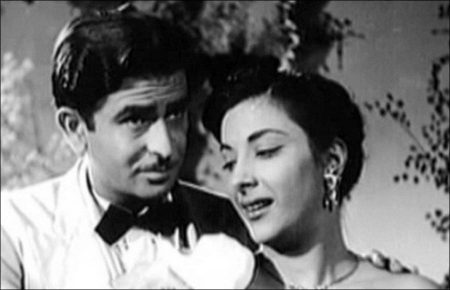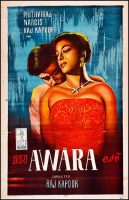Awaara movie storyline. Raju lives as a derelict as a result of being estranged from his bitter father, a district judge, who threw Raju’s mother out of the house years ago. Raju shacks up with a Dacoit (pickpocket bandit) as his surrogate father only to realize that the man is actually responsible for the original misunderstanding between his parents. Raju kills him, and then tries killing his father, but fails, is arrested, and is taken to court right before his very own father, who presides there as the Judge. Raju has his childhood girlfriend as his legal representative, and the onus is now on his father, who must pass judgment without showing any personal sentiment.
Awaara, also written Awāra and known overseas as The Vagabond, is a 1951 Indian crime drama film, produced and directed by Raj Kapoor, and written by Khwaja Ahmad Abbas. It stars Raj Kapoor along with his real-life father Prithviraj Kapoor, as well as Nargis, Leela Chitnis and K. N. Singh. Other members of the Kapoor family make an appearance, including Raj’s youngest real-life brother Shashi Kapoor, who plays the younger version of his character, and Prithiviraj’s father Dewan Basheshwarnath Kapoor, playing a cameo role in his only film appearance. The film’s music was composed by Shankar Jaikishan.
The film expresses socialist themes, and blends social and reformist themes with the crime, romantic comedy and musical melodrama genres. The plot centers on the intertwining lives of a poor thief Raj (played by Raj Kapoor), the privileged Rita (played by Nargis), and Judge Raghunath (played by Prithviraj Kapoor) who is unaware that Raj is his son. In the film, Kapoor’s poor “little tramp” character references Charlie Chaplin and was further developed in other Kapoor films such as Shree 420. Awaara is considered a milestone in the history of Bollywood.
The film became an overnight sensation in South Asia, and found even greater success abroad in the Soviet Union, East Asia, Africa, the Middle East, and Eastern Europe. In particular, the song “Awaara Hoon” (I am a Vagabond), sung by Mukesh with lyrics by Shailendra, became hugely popular across the Indian subcontinent, as well as in countries such as the Soviet Union, China, Bulgaria, Turkey, Afghanistan, and Romania. The film was also nominated for the Grand Prize at the Cannes Film Festival in 1953.
The film is estimated to have sold over 200 million tickets overseas, including more than 100 million in China and about 100 million in the Soviet Union. Owing to its popularity in so many countries, the film is a candidate for the most successful film of all time. In 2012, Awaara was included in the 20 new entries to All-Time 100 greatest films by TIME.
The film is a collaboration of the famous team of director/producer Raj Kapoor and writer Khwaja Ahmad Abbas. K. A. Abbas originally wanted Mehboob Khan to direct the film, but the two disagreed over the casting. Khan wanted Ashok Kumar to play the judge and Dilip Kumar the son. In the event, Abbas withdrew his script from Mehboob Studios and Raj Kapoor decided to direct it.
In his column for the Indian Express, Kapoor wrote, “In Awara I tried to prove that Vagabonds are not born, but are created in the slums of our modern cities, in the midst of dire poverty and evil environment.”
The song “Awaara Hoon” and actor Raj Kapoor were widely known across China and the Soviet Union. The film’s success in both the Soviet Union and China has been attributed to the socialist themes expressed in the film. The film Awaara and the song “Awaara Hoon” are believed to have been among Chairman Mao’s favourite films and songs, respectively. Awaara was referenced in the 2000 Chinese film Platform.[
Directed by: Raj Kapoor
Starring: Raj Kapoo, Shashiraj, Nargis, Baby Zubeida, K. N. Singh, Cuckoo, B. M. Vyas, Leela Misra, Leela Chitnis, Honey O’Brien, D. Basheshernath, Om Parkash, Rajoo, Mansaram, Rajan, Manek Kapoor, Paryag, Ravi, Vinni, Bali, Shinde.
Screenplay by: Khwaja Ahmad Abbas
Production Design by: Vishwa Mehra, Mohanbali
Cinematography by: Radhu Karmakar
Film Editing by: G.G. Mayekar
Art Direction by: M.R. Achrekar
Music by: Shankar-Jaikishan
MPAA Rating: None.
Distributed by: R.K. Films
Release Date: December 14, 1951
Views: 257


